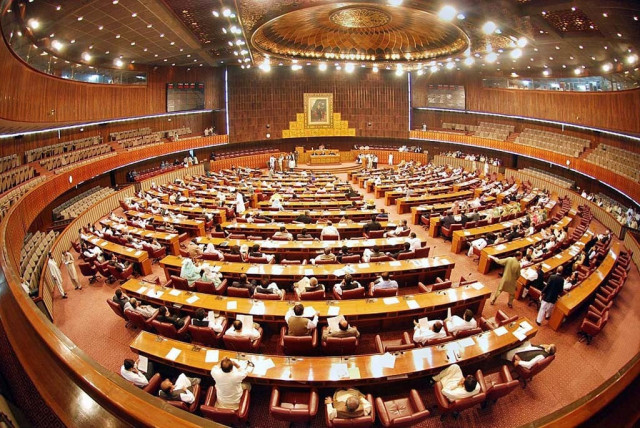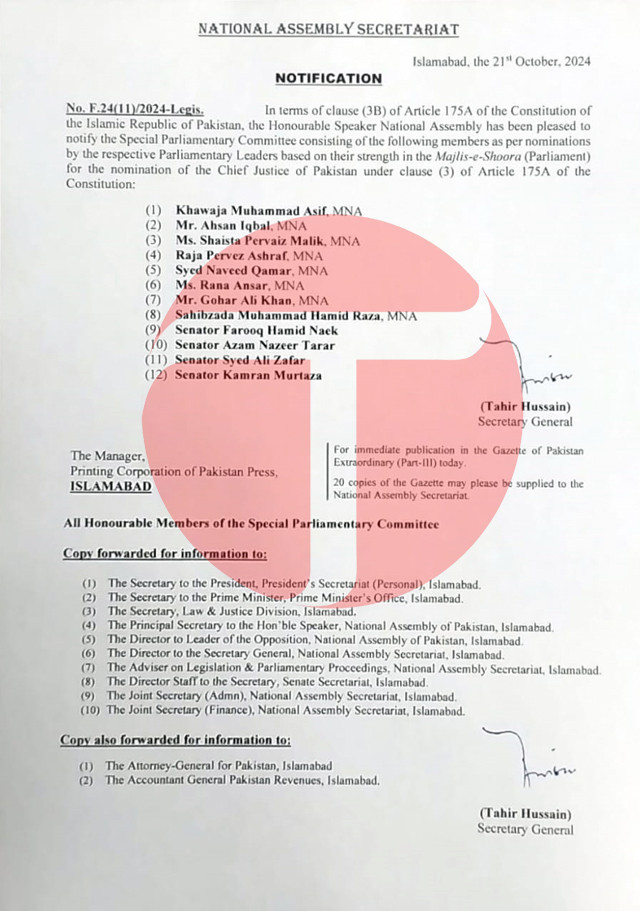Special parliamentary committee formed for CJP appointment
Four senators and eight MNAs have been nominated by political parties represented in parliament

A 12-member special parliamentary committee has been formed to oversee the appointment of Pakistan’s next chief justice, marking a significant shift in the country's judicial selection process.
The committee, established following the 26th Constitutional Amendment, includes representation from the National Assembly and Senate, with nominees from major political parties submitted to the National Assembly speaker’s office.
According to the speaker’s office, four members have been nominated from the Senate. The Jamiat Ulema-e-Islam-Fazl (JUI-F) has named Kamran Murtaza, while the Pakistan Peoples Party (PPP) has nominated seasoned lawyer Farooq H. Naek. The Pakistan Muslim League-Nawaz (PML-N) selected Azam Nazeer Tarar, and Barrister Ali Zafar has been nominated by the Pakistan Tehreek-e-Insaf (PTI).
From the National Assembly, PML-N has put forward senior members Khawaja Asif, Ahsan Iqbal, and Shaista Pervaiz. PPP has nominated former prime minister Raja Pervaiz Ashraf and Naveed Qamar. PTI’s nominees include Barrister Gohar and Sahibzada Hamid Raza, while the Muttahida Qaumi Movement (MQM) has chosen Rana Ansar for the special committee.
The Assembly Secretariat issued a notification for the formation of the parliamentary committee, following the speaker's approval.

A meeting of the special parliamentary committee has been scheduled for tomorrow at 4pm.
The formation of this committee is part of sweeping changes introduced under the 26th Constitutional Amendment, which reforms the process of appointing the Chief Justice of Pakistan. Previously, the Chief Justice was selected based on seniority, but under the new amendment, a three-member panel of senior judges will be reviewed by the parliamentary committee. The committee, requiring a two-thirds majority for approval, will then select the new Chief Justice.
This special committee is tasked with ensuring wider representation in judicial appointments, with the aim of enhancing transparency. The amendment also impacts the process for appointing Supreme Court judges, involving parliamentary members in decisions that were previously handled exclusively within the judiciary.
The committee’s role is to select one name from a panel of senior judges, which will then be forwarded to the Prime Minister for approval. The Prime Minister will submit the name to the President for final ratification, completing the appointment process.
The creation of this committee comes in response to ongoing demands for a more inclusive and accountable process for appointing key judicial figures. Speaking on the amendment, a government official said, "This new system will ensure that the judiciary’s leadership is selected through a more democratic and transparent process, involving broader political representation."
The 26th Amendment was passed with a two-thirds majority in both the National Assembly and Senate, and has since been signed into law by President Asif Ali Zardari. The amendment is widely seen as part of a broader effort to strengthen Pakistan's constitutional and legal frameworks.
Prime Minister Shehbaz Sharif has hailed the amendment’s passage, calling it a "shining example of national consensus." He expressed optimism that the changes will lead to a more just and transparent judicial system. "The era of dismissing elected prime ministers is over," Sharif said, noting that the amendment fulfils the unfinished vision of the Charter of Democracy, a landmark political agreement between the late Benazir Bhutto and Nawaz Sharif.
The prime minister thanked Bilawal Bhutto-Zardari and Maulana Fazlur Rehman for their efforts in securing the amendment's passage, noting that it sends a strong message that the nation’s future is being prioritised over individual interests. "These reforms will pave the way for easier access to justice and ensure Pakistan’s future is secure," he concluded.
The first meeting of the newly formed parliamentary committee is expected to take place tomorrow, where they will begin reviewing the panel of senior judges for the position of Chief Justice. The Ministry of Law has been directed to coordinate with the judiciary to receive the names of the judges to be considered.



















COMMENTS
Comments are moderated and generally will be posted if they are on-topic and not abusive.
For more information, please see our Comments FAQ